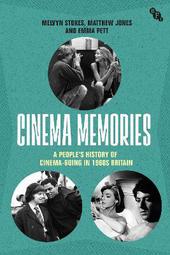
|
Cinema Memories: A People's History of Cinema-going in 1960s Britain
Hardback
Main Details
| Title |
Cinema Memories: A People's History of Cinema-going in 1960s Britain
|
| Authors and Contributors |
By (author) Melvyn Stokes
|
|
By (author) Matthew Jones
|
|
By (author) Emma Pett
|
| Physical Properties |
| Format:Hardback | | Pages:256 | | Dimensions(mm): Height 234,Width 156 |
|
| Category/Genre | Films and cinema
Film theory and criticism |
|---|
| ISBN/Barcode |
9781911239895
|
| Classifications | Dewey:302.2343094109046 |
|---|
| Audience | | Tertiary Education (US: College) | |
|---|
| Illustrations |
10 bw illus
|
|
Publishing Details |
| Publisher |
Bloomsbury Publishing PLC
|
| Imprint |
BFI Publishing
|
| Publication Date |
7 April 2022 |
| Publication Country |
United Kingdom
|
Description
Cinema Memories brings together and analyses the memories of almost a thousand people of going to the cinema in Britain during the 1960s. It offers a fresh perspective on the social, cultural and film history of what has come to be seen as an iconic decade, with the release of films such as A Taste of Honey, The Sound of Music, Darling, Blow-Up, Alfie, The Graduate, and Bonnie and Clyde. Drawing on first-hand accounts, authors Melvyn Stokes, Matthew Jones and Emma Pett explore how cinema-goers constructed meanings from the films they watched - through a complex process of negotiation between the films concerned, their own social and cultural identities, and their awareness of changes in British society. Their analysis helps the reader see what light the cultural memory of 1960s cinema-going sheds on how the Sixties in Britain is remembered and interpreted. Positioning their study within debates about memory, 1960s cinema, and the seemingly transformative nature of this decade of British history, the authors reflect on the methodologies deployed, the use of memories as historical sources, and the various ways in which cinema and cinema-going came to mean something to their audiences.
Author Biography
Melvyn Stokes is Professor of Film History at University College London, UK. He is the author and editor of books including Charlot: How the French Discovered, Wrote About, Defended and Resurrected Charlie Chaplin (Oxford University Press, 2018); Cinema et memoire dans le cinema Anglophone/Memory in-of English-speaking Cinema, ed. (with Z. Saleh) (Michel Houdiard, 2014); American History through Hollywood Film (Bloomsbury, December 2013); Gilda (BFI Film Classics, 2010); Cinema et histoire/Cinema and History, ed. (with G. Menegaldo) (Michel Houdiard, 2008); D.W. Griffith's "The Birth of a Nation": A History of "the Most Controversial Motion Picture of All Time" (Oxford University Press, 2007); Going to the Movies: Hollywood and the Social Experience of Cinema, ed. (with R. Maltby and R. C. Allen) (University of Exeter Press, 2007); and Hollywood Abroad: Audiences and Cultural Exchange, ed. (with R. Maltby) (British Film Institute, 2004). Matthew Jones is Senior Lecturer in Cinema and Television History, De Montfort University, UK. He is the author of Science Fiction Cinema and 1950s Britain (Bloomsbury, 2017). Emma Pett is Lecturer in Film Consumption at the University of East Anglia, UK. She has published articles in journals including The Journal of British Cinema and Television and in edited books.
ReviewsThis research is an excellent reminder of the importance of the cinema experience in that culturally significant decade ... and it also serves to point out just how much has changed over the last fifty years ... [The book] may provoke nostalgia in some older readers, whilst for younger readers it's a fascinating window into an almost lost world. * Cinema Retro Magazine * Cinema Memories paints a fascinating portrait of the place of cinema in the lives and imaginations of its British audiences in the 1960s. Based on an extensive collection of interviews and questionnaires, it makes a vivid contribution both to the social history of the period and to the rapidly developing field of memory studies. -- Richard Maltby, Flinders University, Australia Cinema Memories maps exciting and accessible new routes through the spaces and places of 1960s cinema and social history in Britain. It deftly connects New Cinema History's methodological emphasis on empirical contexts of cinema-going and film reception with intellectual traditions grounded in British Cultural Studies and People's History. -- Jeffrey Klenotic, University of New Hampshire, USA
|